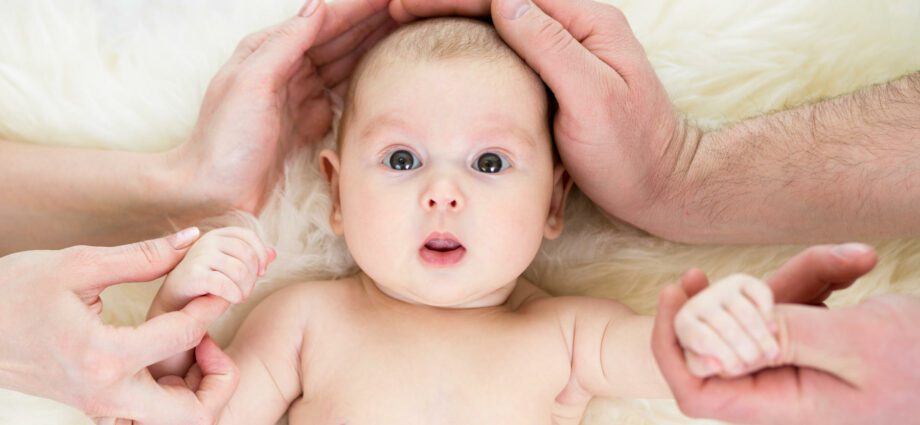Contents
- After 1 to 2 months: from the first smile to the first steps
- After 4 months: Baby sleeps through the night
- Between 6 and 8 months: Baby’s first tooth
- After 6 months: Baby’s first compote
- From 6-7 months: he sits and imitates you
- From 4 years old: your child can see clearly
- From 10 months: his first steps
- Between 6 and 12 months: he says “daddy” or “mom”
After 1 to 2 months: from the first smile to the first steps
Before the end of the first month, the first “angelic smiles” emerge, most often while the baby is sleeping. But the first real intentional smile does not appear until around 6 weeks old when you take care of him: your baby squinting and singing along to express his contentment and well-being to you. As the days go by, his smiles will be more and more frequent and in a few weeks (around 2 months) your baby will give you his first burst of laughter.
After 4 months: Baby sleeps through the night
Again there are no rules, some moms say their baby slept at night after leaving the maternity ward, while others have complained of being woken up every night for a year! But typically, a healthy baby is able to sleep six to eight hours straight without feeling hungry beyond 100 days, or in their fourth month.
Between 6 and 8 months: Baby’s first tooth
Exceptionally, some babies are born with a tooth, but most often it is between 6 and 8 months that the first central incisors appear: two at the bottom, then two at the top. Around 12 months, the lateral incisors will follow in turn, then at 18 months the first molars, etc. In some children, this teething causes red cheeks, diaper rash, sometimes fever, nasopharyngitis and even ear infections.
After 6 months: Baby’s first compote
Up to 6 months your baby needs nothing but milk. In fgeneral, food diversification appears between 4 months (completed) and 6 months. We now know that purees, compotes and meat given too early promote food allergies and obesity. So be patient, even if you really want to introduce your baby to other tastes and flavors. As for the spoon, some take it with joy, others push it away, turn their heads, spit. But don’t worry, the day he’s ready he’ll take it on his own.
From 6-7 months: he sits and imitates you
Around 6 months, a baby can sit alone for about 15 seconds. Leaning forward, he can spread his legs in a V and hold his pelvis. But it will take him another two months to be able to sit upright without support. From 6-7 months, your toddler reproduces what he sees you doing: nodding to say yes or no, waving his hand in farewell, applauding … Over the weeks, he imitates you more. in addition and discover the happiness of provoking your bursts of laughter by a simple mimicry. Too happy with this new power, he does not deprive himself of it!
From 4 years old: your child can see clearly
At one week, baby’s visual acuity is only 1 / 20th: he can only see you well if you look at his face. At 3 months, this acuity doubles and goes to 1 / 10th, at 6 months to 2 / 10ths and at 12 months it is 4 / 10ths. At the age of 1, a toddler can see eight times better than when he was born. His vision is panoramic like yours and he discerns movements perfectly, as well as colors, including pastel tones. MBut it is only at the age of 4 years thanks to a good vision of reliefs, colors and movements, which he will see as well as an adult.
From 10 months: his first steps
From 10 months for some, a little later for others, the child clings to the foot of a chair or a table and pulls on his arms to stand up: what jubilation! He will gradually build up muscles and stay upright for longer and longer, then without support. But it will take many more tries and a few failures to feel ready to embark on the march.
Between 6 and 12 months: he says “daddy” or “mom”
Between 6 and 12 months, here is finally that little magic word that you were looking for so impatiently. In fact, your baby has most certainly pronounced a sequence of syllables with the sound A, his favorite. Delighted to hear himself and to see how much his vocals delight you, he never ceases to offer you his “papa”, “bababa”, “tata” and other “ma-ma-man”. By the age of one, children say an average of three words.
Do you want to talk about it between parents? To give your opinion, to bring your testimony? We meet on https://forum.parents.fr.










